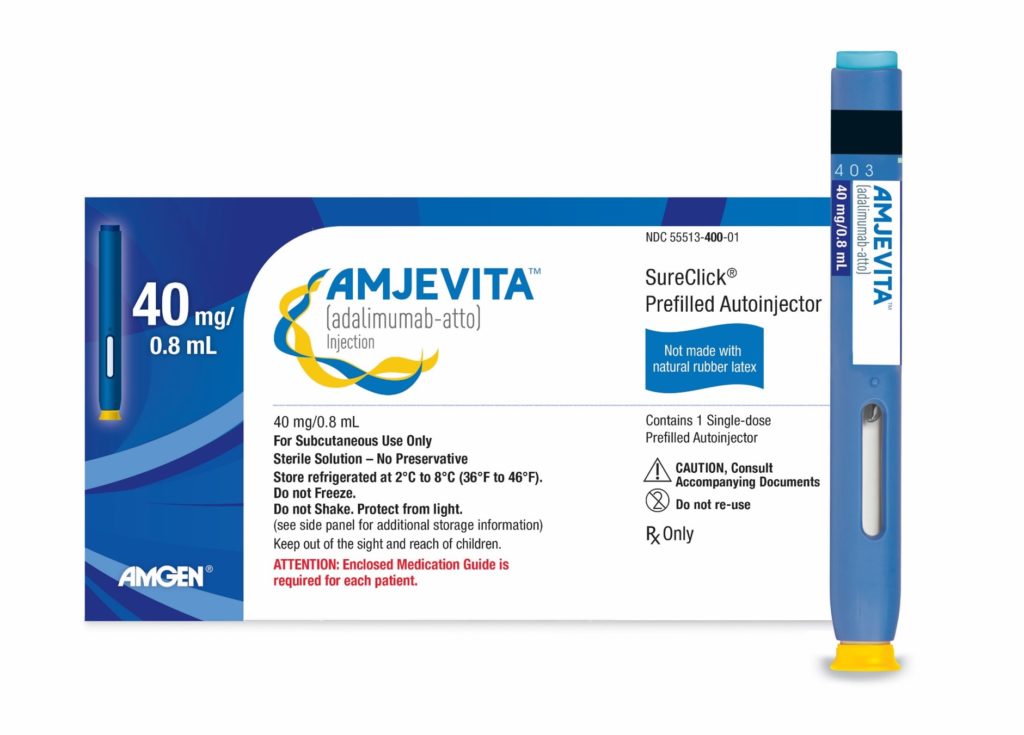Amgen’s Amjevita, the first biosimilar version of AbbVie’s blockbuster arthritis injection Humira (adalimumab), has finally hit the market this week after fetching US Food and Drug Administration (FDA) approval back in 2016.
Amjevita will be offered at two price points — one that is five percent cheaper than Humira’s monthly price of $6,922 and another at a discount of 55 percent.
The higher discounted price will likely not appeal to pharmacy benefit managers (PBMs) that recommend which drugs most insurance providers should cover, according to Reuters.
Due to rebate structures where most co-insurance costs are calculated off the higher price, the more expensive version may become the more popular one among payers.
The dual pricing strategy was also used by Biocon and Viatris when they launched their interchangeable insulin biosimilar Semglee in 2021 (a biosimilar of Sanofi’s Lantus). Despite being more expensive, the branded version ended up being favored by PBMs and insurers over the cheaper unbranded one because of the steep rebates for the former.
Amgen says Amjevita has four years of real-world experience in more than 300,000 patients across over 60 countries.
Humira was introduced into the market 20 years ago and for the last couple of years, has been reigning as the world’s best-selling drug, bringing in nearly $20 billion a year for AbbVie since 2018 and a total of $200 billion since its launch.
Humira is approved for the treatment of ten different conditions, including rheumatoid arthritis, Crohn’s disease, ulcerative colitis and psoriasis.
Related: Idacio Approved as Eighth Adalimumab Biosimilar in the US
AbbVie has been accused of creating a market monopoly with Humira by blocking biosimilars from entering the market and engaging in price hikes. Several companies including Amgen and Alvotech, took AbbVie to court over claims of overpatenting and overpricing.
Amgen reached a global settlement with AbbVie in 2017 after resolving litigation and set January 31, 2023 as the date for launching Amjevita.
Following Amjevita, more than a handful of other Humira biosimilars will be flooding the market this year. Five are expected to launch in July 2023, including Pfizer’s Abrilada and Boehringer Ingelheim’s Cyltezo. Sandoz’s Hyrimoz will follow suit in September.
In December of last year, Fresenius Kabi’s biosimilar Idacio got the FDA nod, adding to the growing list of approved Humira biosimilars, which currently stands at eight. Alvotech’s biosimilar is pending FDA approval.
Amjevita Launch: Cost Savings, But for Whom?
The new competition from Amjevita could bring down spending on adalimumab by almost half. However, there is concern whether the cost savings will actually benefit patients. This is because rebates may only benefit PBMs and not translate into lower out-of-pocket costs for patients.
Juliana M. Reed, executive director of the Biosimilars Forum, released a statement after Amjevita’s launch this week, calling for decision-makers to deliver on Humira biosimilars and asking PBMs to prioritize “patients over profits.”
She urged for Humira biosimilars to be placed on all commercial formularies, including midyear formulary access, meaning that all biosimilars become immediately available once launched.
“The cost-savings of biosimilars can only be realized if all biosimilars — especially biosimilars for Humira — are fully available and accessible to the patients who need them,” said Reed.
“This make-it-or-break-it year for the biosimilars industry requires the full support of policymakers and stakeholders to give patients lower-cost options they deserve.”
In addition to PBMs, most of the cost benefits will also go to insurers, employers and middlemen or intermediaries who negotiate deals with drugmakers to determine insurance coverage for drugs and the prices patients will pay out of pocket.
According to a report by NPR, these middlemen are looking out for their own profits and often favor coverage for a more expensive drug if its manufacturer offers them a lucrative deal.
Two of the largest insurance intermediaries in the US have said they will list Humira biosimilars in the same position as Humira on their formularies. This means preference will not be given to one over another.
Apart from insurance industry dealings, unlike generics of small molecule drugs (mainly formulated as oral pills), biosimilars are copies of biologic drugs, which are generally more complex and expensive to develop as they are made from living cells and their components.
While the Biden Administration’s Inflation Reduction Act introduced in 2022 had brought the unprecedented potential for the government to be able to lower the price of drugs, namely the most expensive drugs for people 65 years of age and older under the government’s Medicare program, drugs like Humira with direct competition are excluded.












Join or login to leave a comment
JOIN LOGIN